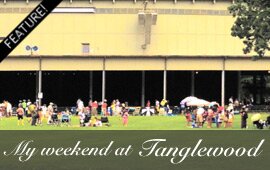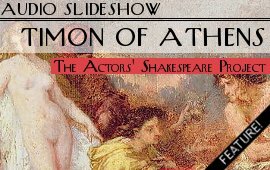
Boston’s lucky to have an orchestra like and while a reviewer might be tempted to focus on their core “gimmicks”–that they are young, stand while performing, and perform without principle players or a conductor–that would really be gimmicky in itself, because nothing should distract attention from the Criers’ unequivocal musicianship. They bring invigorating programming to Boston audiences, maintain low ticket prices, and no one can question the quality and energy of their concerts. For a nice little primer, check out the Globe‘s from two years ago, the sort of thing I’d like to see more of from boston.com.
You might want to pencil in the final concert of their three-concert season, , featuring Honegger, Strauss, a world premiere, and “War-era Jazz Standards.” They’ll be at Jordan Hall April 2nd @ 8:00 ($27, $11 students) and St. John’s Episcopal Church (Revere St. and Roanoke Ave, J.P.) April 3rd @ 2:00 ($10, kids free).
I caught The Lover last Friday @ Jordan and loved the group’s witty take on a “romantic” program and was floored by the sheer string talent on stage that night. And not only was the concert refreshing, but so were Kathryn Bacasmot’s spirited program notes–a nice break from the the usual Grove Music biographies. The Crier’s kicked things off with Hugo Wolf’s Italian Serenade, a sarcastic and programmatic piece featuring rich, wrenching cello passages, courtesy of Courtney Vandiver, that were echoed by Frank Shaw’s viola.
The concert’s star billing belonged to ‘s Concerto Pero Corde, which showcased taught, expressive, and virtuotic fiddling by (I think) Jennifer Curtis. Even bassist Karl Doty Tony Flynt got an elegant solo. The Concerto is marked by spiralling wheels of sound and a kind of neo-Romantic gritty soulfulness that moved from delicate hovering monotones in the first movement to screeching strings evocative of Crumb or The Velvet Underground in the second. A Far Cry demonstrated here, a remarkable synergy and sense of tempi, amplitude, and musical kinetics. They played this zealous and persistent piece with the zealousness and persistence it’s due, projecting rotating musical ideas that swelled and coalesced at high energies. The fourth movement offered up serial folk melodies, ending with strings fluttering like hummingbird wings.
The concert closed with Tchaikovsky’s Souvenir de Florence, the most explicitly romantic piece of music on the program. The first movement projected pulses of sound through Jordan Hall and completed itself with a rousing finish, leading into the balletic second movement that swelled with song-like emotions and effectively turned the orchestra into a chorus. It’s matter-of-fact closing brought us into the folky third movement, like a galloping Russian dance–a theme that was carried over into the hectic, but well plodded fourth movement. A stellar concert and I’m looking forward to hearing more in April.
A Far Cry has some interesting and technical on their blog about their prep for the concert.





This is a long shot, but I wonder if Boston Lowbrow might have any interest in the thriving music scene in the metaverse. A place to start might be my Musical Kinetics, a collaboration between me (Alizarin Goldflake in Second Life) and Tim Risher (Flivelwitz Alsop in Second Life) to be found here: